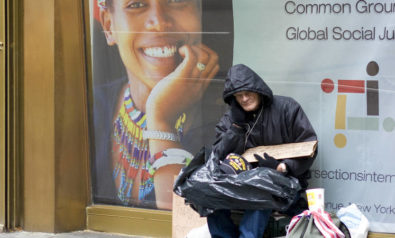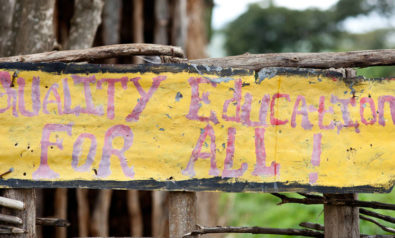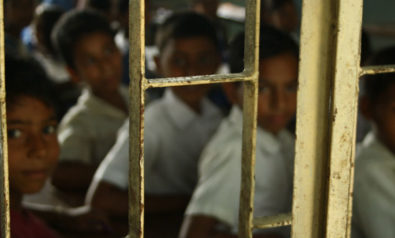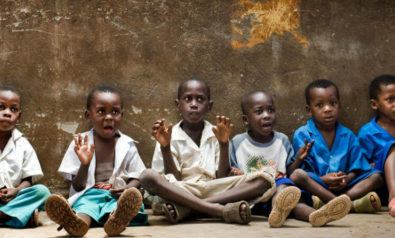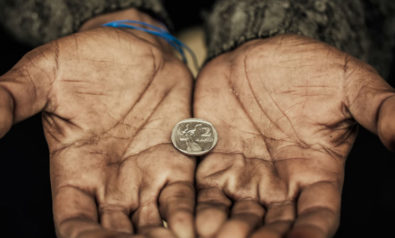The rates of homelessness in Valencia are much higher than official counts.
The Spanish city of Valencia is famous for its wonderful lace and, of course, its oranges.
It is a beautiful city and has so many talented young people living there, but it also hides some sad secrets. Figures show that the unemployment rate within the city is over 20%, and this has had an impact on the increasing numbers of people being displaced, excluded. Without a home, without a job, without choices, without the chance to build a decent life—people whom poverty has left stranded on the street.
The delicate fabric of life has been torn asunder by the disaster of the financial crash of 2008. Even despite a strong family network and the recent election of a new progressive municipality, the solutions to the fallout from the challenge of austerity and unemployment have been limited and unrealistic, particularly in addressing the disaster of homelessness.
I was visiting Valencia with Building and Social Housing Foundation to work with the talented team at RAIS Fundación that runs one of the city’s few day centers. The center is located in the heart of the city and offers homeless people breakfast, a shower and the chance to wash their clothes—those normal everyday tasks we take for granted but which are yet another obstacle for homeless people to feeling included in society.
Trying Out New Ideas
I was in Valencia with Isobel and Kim from the Building and Social Housing Foundation (BSHF), to see the launch of the “pilot of pilots”—an innovative campaign that BSHF are supporting using a model developed in the US by Community Solutions as part of the 100,000 Homes Campaign. This successful campaign took a very different approach to the problem of street homelessness by involving volunteers in meeting homeless people, respecting each person by getting to know them by name, doing rigorous but sensitive surveys that would provide the hard data on age, health status, years on the street but also focus a gentle and empathetic light on each individual person by hearing his or her story.
This process not only motivates and energizes the volunteers but provides such important tools for communicating the urgency of the issue to the wider community, the media and politicians at both local and national level. Over the four years of the campaign, the communities involved found housing for over 100,000 of the most vulnerable rough sleepers in the USA.
BSHF, that runs the World Habitat Awards, was so inspired by the 2013 winners—100,000 Homes Campaign—that they decided to see if it might work in European cities. Working with the European Federation of National Organisations Working with the Homeless (FEANTSA) to identify organizations and cities that might be open to trying out new ideas.
They knew this was an important opportunity to change the lives of homeless people in Valencia and, as Begoña, the inspirational director of the region for RAIS described: “This was a moment to break out of the status quo.” Her passion for change and her frustration shone through in equal measure.
Excluded at Every Turn

Valencia, Spain © Shutterstock
RAIS Fundación are experienced and determined—every day they see homeless people in their day center and on the street. They hear the sad stories of people turned away from the night shelters because they have mental health problems or difficulties with addiction—the very issues that are often a response to their harsh lives on the street.
We met a man—I will call him Josef—who had travelled to Valencia to pick oranges, who never got paid and became trapped, unable to return to his native Romania. For eleven years he has slept on a park bench. Is it any wonder that he turns to alcohol for comfort and solace? So alone, so little hope for the future, so worried about his need for health care, excluded at every turn by the harsh barriers to help.
It was so moving to see Guadalupe, so young, so energetic, who led our band of volunteers around the dark and frightening corners of the parks and shuttered places around the bus station where homelessness people seek refuge after night has fallen.
Despite a full day at work, her energy and compassion were boundless, her bright pink spectacles and her face shone in the dark. We had to walk very fast to keep up, but she was determined. She knows this area well and comes every Tuesday after work to offer support to those whose only home is the street. She is a volunteer with Bokatas, who had partnered with RAIS to mobilize over 280 people to volunteer, to go out on the street for three nights to survey and count every homeless person they could find in Valencia.
It was wonderful to see people gathering on the first night, squashed into the RAIS day center, spilling out into the street, so diligent, so determined, so organized. It was remarkable—controlled but not controlling, well thought out but somehow relaxed and friendly at the same time.
Each group of volunteers had an experienced leader, who already understood the realities of the homeless. We also had the insight and knowledge of people who had been or were homeless themselves. They could guide us all and give confidence to their compatriots on the street that all of us, in our high visibility jackets, were on their side and that they could choose to participate or not. As Guadalupe said so clearly to Josef, “You are in charge.”
I was lucky enough to spend two nights working with Migue, a very dedicated professional who works for RAIS, and the quiet knowledgeable and charming Carlos, an older man (well not so old–younger than me) who had worked for 40 years for the same firm but, when they went bankrupt, his life fell apart. No money for rent, at 62 too young to collect his pension, he showed me the bench by a church in the center of Valencia that became his home. He explained it was safer than other places, a streetlight above the bench, water from a fountain nearby to wash. Carlos was immaculately turned out and told me how important and how hard it had been to keep himself clean and tidy when he was sleeping on the street.
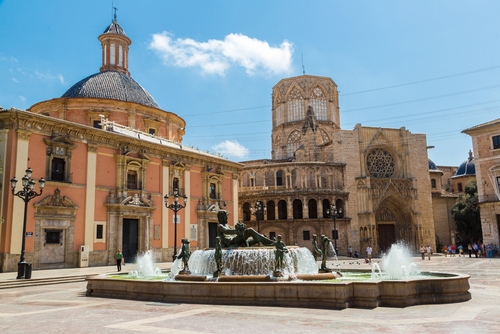
© Shutterstock
Carlos had now found a room in a flat and was doing better. He was on our team to help others, still facing the trauma and challenges of having to live your life on the street, how heavy that toll is.
Both he and Migue were such sensitive guides, so patient, so respectful. We met a couple living in a cardboard box—she was pregnant—having already had four children taken into care because they have no home. No privacy, no utilities—just a garden torch for light; no kitchen—just the plastic knives and forks carefully tucked into the top of the box; no running water—just a plastic bottle or two; no door to shut against the world—just a bit of cloth across the cardboard. They had dignity, but their situation denies it every day and every night and RAIS, their partners, the volunteers and BSHF are determined to change this.
So Many Miles
By the end of the three days, so many miles walked, so many important conversations, so many hours spent by the staff and dedicated volunteers, so much data entered far into the night by volunteers, with the expert help of Paul from Community Solutions, whose experience of thousands of surveys of homeless people is mixed with his knowledge of how to combine sensitivity and rigorous evidence. We all knew we had the evidence, the human stories and the data to show that the beautiful city of Valencia has an ugly problem—that the safety net is torn, and that the official figures do not tell the true story nor describe the scale of the problem.
That marathon street count—taken over three long and tiring nights—had shown that over 400 people were homeless and on the street and this was so much higher than the official figures from the study on homelessness in Valencia by the city council (approximately 79 people in 2015). The reality shows a shocking figure. But it was not shocking to Begoña and her passionate and determined team at RAIS who see so many people with so many difficult stories every day. They already knew that this is a city-wide emergency and that urgent and effective measures must be put in place to get people from the streets into homes as soon as possible. Leaving them on the street is not an option.
We know each day on the street robs years from people’s lives. Everyone must work together to find immediate and effective solutions to rebuild the social fabric of this city, which has so much to be proud of, but can no longer hide this sad, dark and hidden story—of the failure to weave people who are on the street, ignored and excluded, back into a good life in lovely Valencia with its orange trees, its beautiful lace and its proud history of progress and cooperation.
The good news is that the mayor of Valencia and the regional government have already met with RAIS and have announced a Housing First pilot in the city. The log jam is moving and the journey has begun—to end street homelessness in Valencia.
The views expressed in this article are the author’s own and do not necessarily reflect Fair Observer’s editorial policy.
Photo Credit: Maylat / Shutterstock.com
 We bring you perspectives from around the world. Help us to inform and educate. Your donation is tax-deductible. Join over 400 people to become a donor or you could choose to be a sponsor.
We bring you perspectives from around the world. Help us to inform and educate. Your donation is tax-deductible. Join over 400 people to become a donor or you could choose to be a sponsor.
Support Fair Observer
We rely on your support for our independence, diversity and quality.
For more than 10 years, Fair Observer has been free, fair and independent. No billionaire owns us, no advertisers control us. We are a reader-supported nonprofit. Unlike many other publications, we keep our content free for readers regardless of where they live or whether they can afford to pay. We have no paywalls and no ads.
In the post-truth era of fake news, echo chambers and filter bubbles, we publish a plurality of perspectives from around the world. Anyone can publish with us, but everyone goes through a rigorous editorial process. So, you get fact-checked, well-reasoned content instead of noise.
We publish 2,500+ voices from 90+ countries. We also conduct education and training programs
on subjects ranging from digital media and journalism to writing and critical thinking. This
doesn’t come cheap. Servers, editors, trainers and web developers cost
money.
Please consider supporting us on a regular basis as a recurring donor or a
sustaining member.
Will you support FO’s journalism?
We rely on your support for our independence, diversity and quality.



